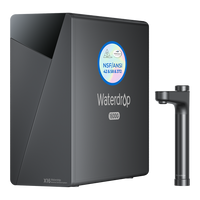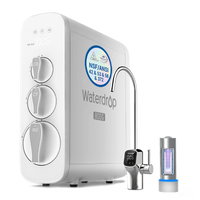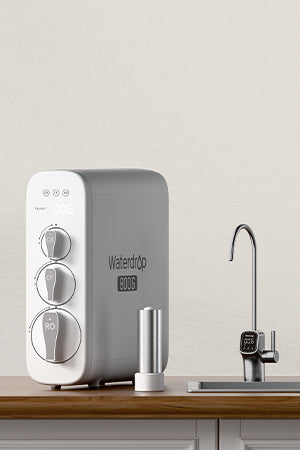Water constitutes a vital necessity for human beings. In its absence, human bodies would be unable to do simple things such as maintaining temperature, eliminating waste, or distributing nutrients throughout the entire body. While food is essential to the body, water is the key to keeping the body's systems functioning.
What will happen if you stop drinking water? For how long can a person survive without drinking water? This article discusses how long a person can live without water and why water should be prioritized.
Why Is Water So Indispensable to the Human Body?
Most of the human body is water, with an average of 60%. All the organs in the body depend on water to perform their functions. Whether it is the oxygenated blood carrying the life-sustaining oxygen to your brain or the perspiration that helps cool your body down, water is the key to nourishing your health.
Functions of Water in the Human Body
- It regulates the temperature of the body.
- It improves the lubrication and health of the joint.
- It eliminates waste through sweat and urination.
- It aids healthy digestion of food and absorption of nutrients in the body.
- It supports healthy blood pressure and circulation.
- It transports oxygenated blood and nutrients to cells.
When you do not drink sufficient water, these processes start to shut down. This makes dehydration quickly become a serious condition.
How Long Can A Person Live Without Water?
An average individual can last up to three to five days without a water supply, which depends on several factors like the climate, activity level, age, and overall health. Under extreme circumstances, like hot weather or during exercise, survival time without water may be reduced to a few days or even less.
What Influences Survival Without Water?
Environmental Temperature
Hot and arid climates accelerate the process of dehydration as there is more sweating and evaporation. Individuals in such environments dehydrate more and can only last 24 or 48 hours.
Physical Activity
Work or a strenuous activity leads to more water loss in the form of sweat. The body can shut down much quicker without the replenishment of water.
Individual Health
People who suffer from a life-threatening condition, particularly kidney disease, or those taking diuretics, are more prone to dehydration.
Age
Babies and older people are particularly susceptible to water loss . It may be that their bodies are not very good at keeping the right balance of water, so dehydration can get worse more quickly and become deadly.
Stages of Dehydration
Dehydration doesn't happen overnight; it is a process that occurs in stages, with the effects of it building up over time. In the first instance, not drinking a couple of glasses of water a day might seem okay, especially if you don't feel thirsty. However, your body still needs water to regulate and maintain body temperature, transport nutrients, and eliminate waste.
Inadequate water consumption, even soft dehydration, can result in fatigue, headache, and a bad mood. If it is disregarded, it can lead to worse symptoms such as dizziness, rapid heartbeat, and disturbance. That's why
daily hydration is a long-term health and well-being issue.
Stage 1: Mild Dehydration symptoms (1-2% body weight lost)
- Dry mouth or dry tongue
- Thirst
- Decreased urine output and dark-colored urine
- Headache
- Fatigue
Stage 2: Moderate Dehydration (3-5% body weight lost)
- Rapid heartbeat and breathing
- Feeling dizzy
- Dark yellow urine
- Very Dry skin
- Irritability
Stage 3: Severe Dehydration (6% or more)
- Being confused
- Low blood pressure
- Fainting
- Organ failure
- Coma or death
Severe dehydration requires urgent medical attention. After two days without water, particularly under hot conditions, a person must get medical help.
Real-Life Examples of Survival Without Water
People may survive more than five days without water, as documented, but this is more of an exception under normal circumstances.
It was reported in 1979 about a man in Austria named
Andreas Mihavecz who lasted 18 days without food and water in a police cell. However, he survived due to the cool temperature and lack of physical activity.
Conversely, the hikers trapped in the desert may succumb to dehydration within 24 hours. These examples demonstrate how key factors such as temperature and exertion are significant to the survival time without water.
How to Properly Stay Hydrated?
Having learned about the danger of dehydration now, here are some easy tips to keep yourself hydrated:
Drink Enough Water Daily
The standard suggestion is 8 glasses (approximately 2 liters) daily, although an individual's requirement can differ based on the activity level and climate.
Eat Hydrating Foods
The best fruits and vegetables to help you stay hydrated include watermelon, cucumber, oranges, and strawberries. They are known to contain high water content and can supplement your fluid intake.
Avoid Dehydrating Drinks
Avoid or reduce drinks that enhance dehydration, including caffeinated or alcoholic beverages.
Use a Water Filter
Clean water is essential. A
reverse osmosis system or faucet water filter will guarantee that your water is devoid of contaminants and safe to drink every day.
Warning Signs You're Not Drinking Enough Water
Many times, symptoms of dehydration can be delicate and complicated. They include:
- Constant fatigue
- Repeated headaches
- Dry lips or skin
- Dark-colored urine
- Cravings for salty foods
When you encounter any of the symptoms mentioned, drinking more water and closely watching how your body reacts is a good idea.
How to Survive in an Emergency Situation Without Water?
In case you have no access to water, here are some survival tips you could follow:
Avoid direct exposure to high sunlight to lower the rate of sweating and lessen dehydration.
- Do Not Eat if You Do Not Have Water to Drink
Water is essential in the digestion of food. Eating can even compound dehydration if you do not have water to drink.
- Move as Little as Possible
Physical exercise leads to a progressive loss of water. Observe constant rest and save strength.
- Collect Morning Dew or Rain
Always use plastic covers or clean clothes to collect water from natural sources.
Final Thoughts: Water Is Life
The human body is quite resilient and can adapt to challenges, but life without water would reduce lifespan. Only a few people can stay alive for a few days without water. As a result, proper hydration is one of the simplest ways of ensuring and maintaining our health.
Drinking uncontaminated water should be a regular habit, especially during the day when the weather is hot or when you engage in physical activities. Access to clean and safe drinking water should always be the priority, whether at home, on the road, or in an emergency.










































































